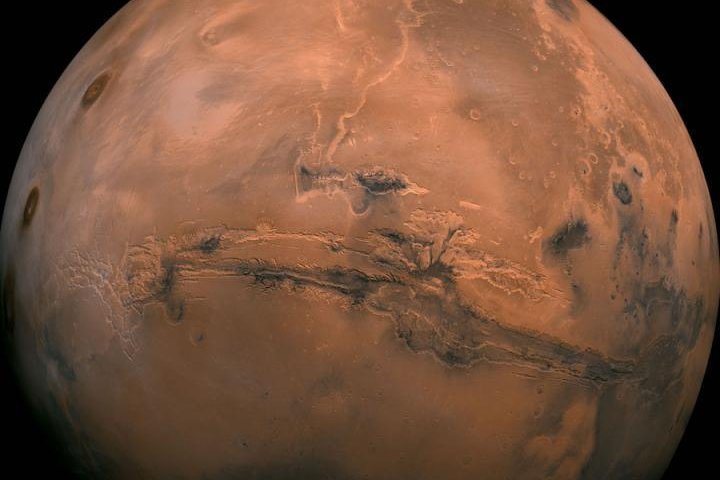New research suggests Mars once released enough methane to encourage spells of global warming, triggering periods of warming significant enough to allow water to flow on the Red Planet. Photo by NASA
Jan. 24 (UPI) -- There is overwhelming evidence that water flowed across and collected on the surface of Mars some 3 billion to 4 billion years ago. Yet, most models predict early Mars was too cold for liquid water. What gives?
New research suggests water may have been allowed to flow during intermittent periods of warming triggered by bursts of methane.
A few billion years ago, the Martian atmosphere was more substantial than it is today. Researchers at Harvard believe unique interactions between methane, carbon dioxide and hydrogen in Mars' early atmosphere produced a greenhouse gas effect and yielded periods of warming.
"Early Mars is unique in the sense that it's the one planetary environment, outside Earth, where we can say with confidence that there were at least episodic periods where life could have flourished," Robin Wordsworth, assistant professor of environmental science and engineering at Harvard, said in a news release. "If we understand how early Mars operated, it could tell us something about the potential for finding life on other planets outside the solar system."
Today, what's left of Mars' atmosphere is 95 percent CO2. But carbon dioxide alone can't explain the Red Planet's ancient warming spells.
Wordsworth and his colleagues surmised that geologic processes on Mars were once capable of producing a significant amount of methane. Lighter gases like methane are easily lost to space by rocky planets over time, so it makes sense Mars would have much less methane today than it did a few billion years ago.
Researchers built a model to better understand how influxes of methane would have behaved and influenced the Martian atmosphere.
"When you're looking at exotic atmospheres, you can't compare them to Earth's atmosphere," said Wordsworth. "You have to start from first principles. So we looked at what happens when methane, hydrogen and carbon dioxide collide and how they interact with photons. We found that this combination results in very strong absorption of radiation."
Their analysis -- detailed in the journal Geophysical Researcher Letters -- showed Mars' ancient atmosphere would have absorbed much more solar energy than previously estimated.
"This research shows that the warming effects of both methane and hydrogen have been underestimated by a significant amount," said Wordsworth. "We discovered that methane and hydrogen, and their interaction with carbon dioxide, were much better at warming early Mars than had previously been believed."
Researchers hope future Mars missions can shed additional light on the geologic processes that encouraged Martian methane emissions.















